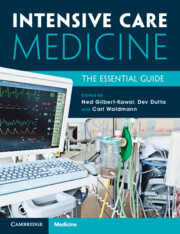Book contents
- Intensive Care Medicine
- Intensive Care Medicine
- Copyright page
- Dedication
- Dedication
- Epigraph
- Contents
- Contributors
- Preface
- Foreword
- Abbreviations
- Section 1 Resuscitation and Management of the Acutely Ill Patient
- Section 2 Diagnosis, Assessment, Investigation, Monitoring and Data Interpretation
- Domain 3 Disease Management: Recognition, Causes and Management
- Section 4 Therapeutic Interventions and Organ Support
- Domain 5 Practical Procedures
- Section 6 Perioperative Care
- Section 7 Comfort and Recovery
- Section 8 End-of-Life Care
- Introduction
- Withholding or Withdrawing Treatment
- Presumption in Favour of Prolonging Life
- Decisions Need to Be Informed by Multidisciplinary Team Assessment
- Put Patients at the Heart of the Decision-Making Process
- When a Treatment Is Deemed to Clearly Offer no ‘Clinical Benefit’
- When the Overall Benefit of a Treatment Is Less Clear
- Clinically Assisted Nutrition and Hydration
- Disagreement
- Care of the Patient during Withdrawal of Life-Sustaining Treatment
- Introduction
- Treat Your Patient as an Individual
- Capacity
- Confidentiality
- Rapport
- Know All the Relevant Information
- Optimise the Setting
- What Does the Patient Already Know?
- What Does the Patient Want to Know?
- Warning Shot
- Speak Honestly and Directly
- Allow the Expression of Emotions
- Listen to Concerns and Answer Questions
- Agree New Goals
- Summarise
- Pitfalls to Avoid
- Tricky Cases
- Introduction
- ‘Good Death’
- Recognising the Dying Patient
- The Decision-Making Process
- Decisions and Care at the End of Life
- Recognising Symptoms
- Involving Family Members
- Religion and Spirituality
- Communication
- Definition of Death
- The Personnel
- Brainstem Reflexes
- The Apnoea Test
- Ancillary Tests
- Introduction
- Pathophysiological Changes after Brainstem Death
- Stabilisation of a Brain-Dead Donor to Optimise Organ Function
- General Management
- Introduction
- Controlled and Uncontrolled Donations
- The Process of Controlled DCD
- Ischaemia Times
- Patients from Emergency Department
- 8.1 How to Manage the Process of Withholding or Withdrawing Treatment with the Multidisciplinary Team
- 8.2 How to Discuss End-of-Life Care with Patients and Their Families/Surrogates
- 8.3 Managing Palliative Care of the Critically Ill Patient
- 8.4 Brainstem Death Testing
- 8.5 Physiological Support of the Organ Donor
- 8.6 Management of Organ Donation Following Circulatory Death
- Section 9 Paediatric Care
- Section 10 Transport
- Section 11 Professionalism, Patient Safety, Governance and Health Systems Management
- Index
- References
8.1 - How to Manage the Process of Withholding or Withdrawing Treatment with the Multidisciplinary Team
from Section 8 - End-of-Life Care
Published online by Cambridge University Press: 27 July 2023
- Intensive Care Medicine
- Intensive Care Medicine
- Copyright page
- Dedication
- Dedication
- Epigraph
- Contents
- Contributors
- Preface
- Foreword
- Abbreviations
- Section 1 Resuscitation and Management of the Acutely Ill Patient
- Section 2 Diagnosis, Assessment, Investigation, Monitoring and Data Interpretation
- Domain 3 Disease Management: Recognition, Causes and Management
- Section 4 Therapeutic Interventions and Organ Support
- Domain 5 Practical Procedures
- Section 6 Perioperative Care
- Section 7 Comfort and Recovery
- Section 8 End-of-Life Care
- Introduction
- Withholding or Withdrawing Treatment
- Presumption in Favour of Prolonging Life
- Decisions Need to Be Informed by Multidisciplinary Team Assessment
- Put Patients at the Heart of the Decision-Making Process
- When a Treatment Is Deemed to Clearly Offer no ‘Clinical Benefit’
- When the Overall Benefit of a Treatment Is Less Clear
- Clinically Assisted Nutrition and Hydration
- Disagreement
- Care of the Patient during Withdrawal of Life-Sustaining Treatment
- Introduction
- Treat Your Patient as an Individual
- Capacity
- Confidentiality
- Rapport
- Know All the Relevant Information
- Optimise the Setting
- What Does the Patient Already Know?
- What Does the Patient Want to Know?
- Warning Shot
- Speak Honestly and Directly
- Allow the Expression of Emotions
- Listen to Concerns and Answer Questions
- Agree New Goals
- Summarise
- Pitfalls to Avoid
- Tricky Cases
- Introduction
- ‘Good Death’
- Recognising the Dying Patient
- The Decision-Making Process
- Decisions and Care at the End of Life
- Recognising Symptoms
- Involving Family Members
- Religion and Spirituality
- Communication
- Definition of Death
- The Personnel
- Brainstem Reflexes
- The Apnoea Test
- Ancillary Tests
- Introduction
- Pathophysiological Changes after Brainstem Death
- Stabilisation of a Brain-Dead Donor to Optimise Organ Function
- General Management
- Introduction
- Controlled and Uncontrolled Donations
- The Process of Controlled DCD
- Ischaemia Times
- Patients from Emergency Department
- 8.1 How to Manage the Process of Withholding or Withdrawing Treatment with the Multidisciplinary Team
- 8.2 How to Discuss End-of-Life Care with Patients and Their Families/Surrogates
- 8.3 Managing Palliative Care of the Critically Ill Patient
- 8.4 Brainstem Death Testing
- 8.5 Physiological Support of the Organ Donor
- 8.6 Management of Organ Donation Following Circulatory Death
- Section 9 Paediatric Care
- Section 10 Transport
- Section 11 Professionalism, Patient Safety, Governance and Health Systems Management
- Index
- References
Summary
Key Learning Points
1. The presumption in favour of prolonging life is not absolute.
2. Skilful communication with the patient and those close to them is needed to establish which treatments are of ongoing benefit.
3. Treatments can be withheld/withdrawn when refused by a patient with capacity or when deemed not to be in the best interests of a patient who lacks capacity.
4. Do Not Attempt Cardiopulmonary Resuscitation (DNACPR) decisions need to be communicated to patients and those close to them, unless this will cause physical or psychological harm.
5. Devise an individualised end-of-life care plan before life-sustaining treatments are withdrawn.
- Type
- Chapter
- Information
- Intensive Care MedicineThe Essential Guide, pp. 671 - 673Publisher: Cambridge University PressPrint publication year: 2021



